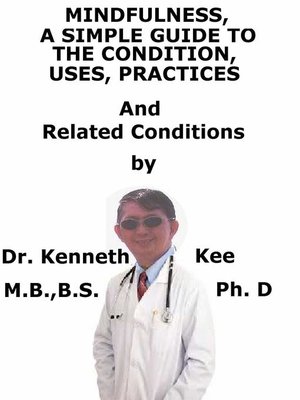Mindfulness, a Simple Guide to the Condition, Uses, Practices and Related Conditions
ebook
By Kenneth Kee

Sign up to save your library
With an OverDrive account, you can save your favorite libraries for at-a-glance information about availability. Find out more about OverDrive accounts.
Find this title in Libby, the library reading app by OverDrive.



Search for a digital library with this title
Title found at these libraries:
| Library Name | Distance |
|---|---|
| Loading... |
Mindfulness is a state of active, open attention on the present mental and physical health.When a person is mindful, he or she observes the thoughts and symptoms from a distance, without judging them good or bad.Instead of letting the life pass the person by, mindfulness means living in the moment and awakening to experience.It can be easy to rush through life without stopping to notice much.Paying more attention to the present moment to the person's thoughts and sensations, and to the world around the person can improve the mental and physical well being.Some people call this awareness "mindfulness".Mindfulness can help people enjoy life more and understand their mind and body better.The Four Foundations of Mindfulness are key things that people should practice being mindful of.1. The bodies,2. The feelings,3. The minds themselves, and4. The phenomena or the world around them.Medical psychology and psychiatry have developed a number of therapeutic applications based on mindfulness for helping people who are experiencing a variety of psychological conditions.Mindfulness practice is being used in psychology to alleviate a variety of mental and physical disorders, such as bringing about:1. Reductions in depression symptoms,2. Reducing stress and anxiety and3. The treatment of drug addiction.Recent studies reveal that mindfulness meditation significantly alleviates pain through multiple, unique mechanisms.Mindfulness also permits people to become more aware of the stream of thoughts and feelings that they feel, and to see how they can become entangled in the ways that are not helpful.The mindfulness allows them stand back from their thoughts and start to see their patterns.Generally, people can educate themselves to notice when their thoughts are taking over and realize that thoughts are simply mental events that do not have to affect them.How to be more mindful:Observe the everydayMake it regularAttempt something newForget the worriesGive names to thoughts and feelingsGet themselves away from the past and futureHow Mindfulness Can Help the Health:Mindfulness, the art of being fully present in the moment, may give the mind and the body a boost.There is consistent evidence that mindfulness reduces stress, depression, and anxiety, and that flows into other thingsRecent neurobiological studies have shown that learning mindfulness produces significant changes in brain structure and function associated with self-regulation, learning, memory, emotional regulation, perspective, and self-referential processing.Other conditions helped by mindfulness are:1.Chronic pain,2.Cancer,3.Grieving,4.Insomnia,5.Irritable bowel syndrome,6.Depression,The benefits of mindfulness1. It can better the test scores and working memory — the type of memory used to do a math problem in the head.2. It may help improve depression, anxiety, and sleep quality, too.3. Mindful people might have lower blood pressure, lower blood sugar, and better heart health.4. People who got a flu vaccine after 8 weeks of mindfulness training developed more antibodies against the flu than those who only got the vaccine.5. It may relieve symptoms of irritable bowel syndrome and cut down on migraines, too.6. It could also ease pain or at least the perception of it.Mindfulness Practice:Posture: sit straightGaze: look downBreath: natural breathing in and outThoughts: honest thoughtsA practitioner has, playfully, placed the practice down to:1. Sit Down,2. Shut Up, and3. Pay AttentionAdverse Side Effects:DepersonalizationPsychosisAnxietyHigher risk of seizureThe doctor should take note of all these when advising mindfulness.TABLE OF CONTENTIntroductionChapter 1 MindfulnessChapter 2 Mindful PracticesChapter 3 HealthChapter 4...







